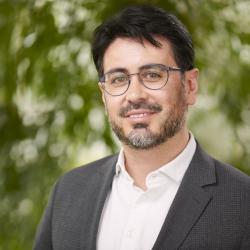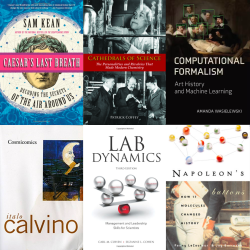Chemistry and Biochemistry’s Efrain Rodriguez Receives National Science Foundation CAREER Award
Efrain Rodriguez, an assistant professor of chemistry and biochemistry at the University of Maryland, received a Faculty Early Career Development (CAREER) Award from the National Science Foundation (NSF) for his proposal titled “Designing Hund’s Metals from Transition Metal Sulfides.” Rodriguez will use the $625,000 award to develop a new class of materials with functional magnetic and electronic properties.
“Receiving an NSF CAREER award is a great honor because it represents validation from the materials chemistry community of our work in research and education,” said Rodriguez. “We are excited to develop innovative ways to prepare new compounds that could change our understanding of the relationship between magnetism and electrical conductivity.”
Rodriguez’s interests lie in iron-based compounds that can be used as superconductors, which are materials that conduct electrical current with zero resistance below a “critical temperature”. When iron-based superconductors were discovered in 2008, scientists questioned what role magnetism, which is almost synonymous with iron, plays in these materials’ superconducting properties. Following the lead of recent theoretical models predicting that the magnetism in iron-based superconductors may be more general, Rodriguez will look for other systems that display the specific type of magnetic behavior closely related to superconductivity. The compounds of interest include sulfides and selenides of iron, nickel and cobalt, and have been termed “Hund’s metals” in honor of the early 20th century physicist Friedrich Hund, who came up with very simple rules explaining how electrons couple magnetically at the atomic scale. Rodriguez hopes that finding new Hund’s metals and characterizing their unique electrical and magnetic behaviors will lead to a better understanding of iron-based superconductors and a search for new superconductors.
The project will provide training for both graduate and undergraduate students in synthesizing new solids and characterizing the atomic structure and physical properties of the materials with advanced instrumentation. The students will also participate in outreach activities, by engaging high school chemistry students near UMD through tutoring and tours of nearby national laboratories. Rodriguez calls this the “leadership cascade” model, by which he mentors undergraduate students involved in research and they in turn mentor high school students interested in the sciences. Rodriguez, who is the faculty adviser of the American Chemistry Society (ACS) UMD student affiliates, has led efforts to organize tutoring and other outreach events at Northwestern High School in nearby Hyattsville, Md.
Rodriguez has authored more than 41 peer-reviewed journal publications in the fields of materials chemistry and condensed matter physics, focusing mainly on magnetic and superconducting compounds. Before joining the UMD faculty in 2012, Rodriguez worked at the National Institute of Standards and Technology’s Center for Neutron Research as a postdoctoral fellow. Rodriguez earned his bachelor’s degree in materials science and engineering from the Massachusetts Institute of Technology and his doctoral degree in materials science from the University of California, Santa Barbara.
The CAREER award is the NSF's most prestigious award in support of junior faculty members who exemplify the role of teacher-scholars through outstanding research, excellent education and the integration of education and research within the context of the mission of their organizations. The award provides five years of financial support.
Media Relations Contact: Abby Robinson, 301-405-5845, abbyr@umd.edu
University of Maryland
College of Computer, Mathematical, and Natural Sciences
2300 Symons Hall
College Park, MD 20742
www.cmns.umd.edu
@UMDscience
About the College of Computer, Mathematical, and Natural Sciences
The College of Computer, Mathematical, and Natural Sciences at the University of Maryland educates more than 7,000 future scientific leaders in its undergraduate and graduate programs each year. The college's 10 departments and more than a dozen interdisciplinary research centers foster scientific discovery with annual sponsored research funding exceeding $150 million.







